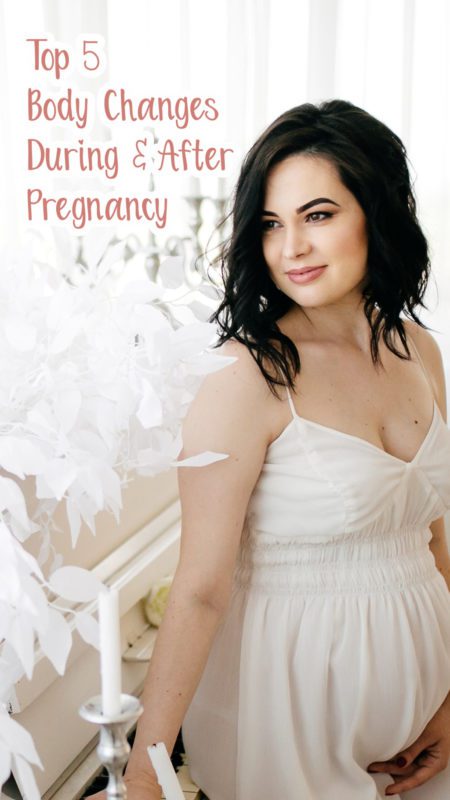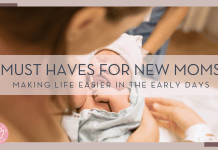Pregnancy is an amazing, beautiful and life-changing event, but what exactly does it do to your body and what, if anything, can be done to minimize the long-term effects? To find out, we turned to Florida Hospital’s board-certified obstetrician and gynecologist, Jessica Auffant, MD, and physical therapist, Heather Shanahan, for answers.
“Hormones, or more specifically, changes in your hormone levels during pregnancy are responsible for all the changes that take place while you’re pregnant,” explains Dr. Auffant. “And because all pregnancies are different, because all women are different, you may experience some or all of the common changes that take place during and after pregnancy.”
Top 5 Body Changes During and After Pregnancy
 1. Hair and Skin
1. Hair and Skin
“During your pregnancy you’ll find that your hair grows exceptionally well and doesn’t fall out at the rate that it used to,” say Dr. Auffant. “But after having your baby you may start losing it faster than ever before. Don’t worry, you’re not going to go bald. After your hormones reset you’ll see your hair go back to normal.”
Other changes you may see during your pregnancy are an increase in acne, skin rashes, chloasma or melasma, commonly called a pregnancy mask, which is marked by dark patches that appear on the face or neck; linea nigra, commonly referred to as a pregnancy line, which is a dark line that appears on the abdomen between the navel and the pubic bone; your gums bleeding more than normal, nosebleeds or congestion, changes in your vision, heartburn, and assorted aches and pains.
2. Weight Gain
“You’re obviously going to put on weight while you’re pregnant, but it won’t just be in your belly,” says Dr. Auffant. “Your body during pregnancy is preparing for worst case scenarios and will try to add a protective layer of fat that can be burned if food isn’t readily available. By and large, these safety precautions that are hardwired into us are leftovers from our ancestors when food scarcity was far more common.” Many women wear a postpartum girdle or corset to get get back in shape after giving birth.
Along with gaining weight, you may also develop stretch marks. Dr. Auffant says you should try not to stress about whether you’ll get them — and that it might be out of your control, anyway. “There’s a lot of talk out there about different lotions helping with stretch marks, but it really comes down to your genetics. You may or may not get them and if you do, don’t worry about it too much; they’ll fade over time.”
3. Breast Changes
Along with your healthy weight gain during pregnancy, you’ll notice your breasts enlarging in preparation for breastfeeding your baby. And whether you plan to breastfeed or not, your body is going to take the same steps to prepare. You may also notice that your areolas and nipples have darkened in color. This is due to your increased hormone levels and they will likely go back to their normal color in time.
4. Mental Health
“Hormones don’t only affect your body during and after pregnancy but your mind, as well,” explains Dr. Auffant. “After your baby is born you may suffer from postpartum depression. Many women go through this difficult transition, with differing levels of severity. Postpartum depression is very similar to regular depression and should be treated by a professional. If you suspect you’re suffering from postpartum depression, please seek medical attention.”
5. Pelvic Health
“Giving birth vaginally can be a traumatic event for your pelvic muscles,” says Heather Shanahan, a physical therapist who helps moms regain their pelvic health after having children. “C-sections have their own risks involved with injuring pelvic muscles, as well, of course. If left untreated the damage done to your pelvic muscles can lead to urinary incontinence, difficulty having a bowel movement, and even pelvic organ prolapse.”
Physical therapy in the early stages and throughout your pregnancy can prepare you for birth through training and exercise.
“By training with us early on in your pregnancy, you’ll learn how to maintain strength during your pregnancy through exercise that will put less stress on you and your baby in labor and make for a much easier, shorter delivery,” explains Shanahan. “And by starting early you’ll be able to recover faster after the birth.”
“Physical therapy should carry on into your postpartum care to get you back to your normal lifestyle as quickly as possible. Our physical therapists provide this care in the safest, most private way possible.”
Find a Specialist
We believe in the whole health and well-being of you and your baby from conception to birth and beyond. We’re committed to providing you with the best care available. If you’re experiencing these symptoms take our Body After Baby symptoms quiz or call our Women’s Health Navigator at 407-720-5191 to discuss your next steps on the path to well-being.



















Even though these are normal changes we should check regularly to avoid problems when the time that you are about to go on a labor…
Nice blog really useful for pragnent ladies. Losing weight after pregnancy depends on many factors like the lifestyle you lead, how much weight you have put on, if you are breastfeeding or not, if you delivered naturally or through C-section, there are many a things to consider before you put yourself on a strict diet or start losing mind at the gym. It’s better to understand your body and what it needs first because now you also have a child to care for who is primarily and mostly dependent on you.